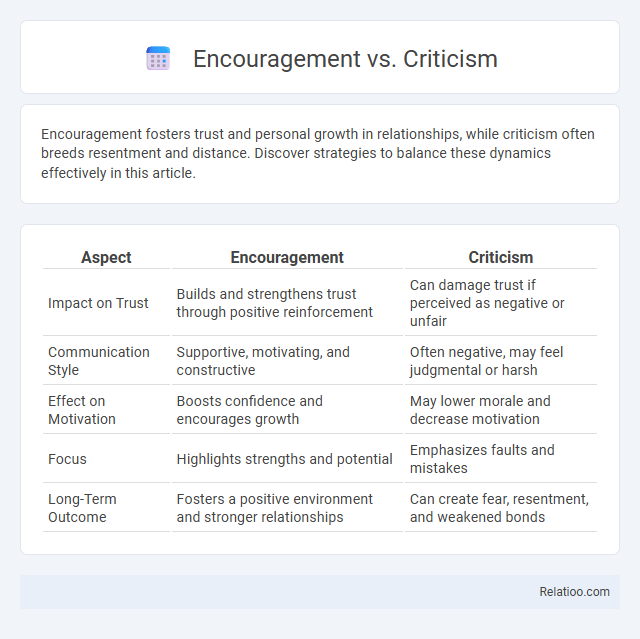Encouragement fosters trust and personal growth in relationships, while criticism often breeds resentment and distance. Discover strategies to balance these dynamics effectively in this article.
Table of Comparison
| Aspect | Encouragement | Criticism |
|---|---|---|
| Impact on Trust | Builds and strengthens trust through positive reinforcement | Can damage trust if perceived as negative or unfair |
| Communication Style | Supportive, motivating, and constructive | Often negative, may feel judgmental or harsh |
| Effect on Motivation | Boosts confidence and encourages growth | May lower morale and decrease motivation |
| Focus | Highlights strengths and potential | Emphasizes faults and mistakes |
| Long-Term Outcome | Fosters a positive environment and stronger relationships | Can create fear, resentment, and weakened bonds |
Understanding Encouragement and Criticism
Encouragement fosters motivation and confidence by highlighting strengths and potential, while criticism provides critical feedback aimed at identifying areas for improvement. Understanding encouragement involves recognizing its role in reinforcing positive behaviors and boosting self-esteem, whereas criticism focuses on constructive evaluation to promote growth and skill refinement. Balancing encouragement and criticism effectively enhances personal development and maintains a supportive environment.
The Psychological Impact of Words
Words wield significant power in shaping mental health, where encouragement fosters confidence by activating positive neural pathways linked to motivation and resilience. Criticism, especially when harsh or persistent, can trigger stress responses, increasing cortisol levels and potentially leading to anxiety or lowered self-esteem. Balanced encouragement, combined with constructive feedback, promotes growth by reinforcing strengths while guiding improvement without undermining psychological well-being.
Benefits of Encouragement in Personal Growth
Encouragement significantly boosts personal growth by fostering self-confidence and resilience, enabling individuals to embrace challenges and learn from setbacks. Positive reinforcement enhances motivation and creativity, leading to improved problem-solving skills and emotional well-being. By cultivating a supportive environment, encouragement helps individuals unlock their full potential and achieve sustained personal development.
Consequences of Harsh Criticism
Harsh criticism often leads to decreased motivation, reduced self-esteem, and heightened anxiety, hindering personal growth and performance. Unlike constructive encouragement, it can create a negative emotional environment that stifles creativity and collaboration. Effective feedback balances honest evaluation with supportive language to foster resilience and improvement.
Striking a Balance: Constructive Critique
Striking a balance in encouragement, criticism, and encouragement involves delivering constructive critique that motivates improvement without diminishing confidence. Your feedback should be specific, actionable, and framed in a way that highlights strengths while addressing areas for growth, fostering a positive environment for development. Mastering this balance enhances communication effectiveness and supports sustained personal and professional progress.
Encouragement in Professional Environments
Encouragement in professional environments fosters employee engagement, boosts morale, and enhances productivity by creating a positive atmosphere that supports innovation and risk-taking. Constructive encouragement, including specific praise and recognition of achievements, promotes skill development and strengthens team collaboration. Emphasizing encouragement over criticism reduces workplace stress and turnover, leading to sustainable organizational growth and employee satisfaction.
Criticism and Its Role in Learning
Criticism plays a crucial role in learning by providing specific feedback that helps identify areas for improvement and fosters personal growth. When delivered constructively, criticism guides your development by highlighting mistakes and offering practical solutions, enhancing skill acquisition and performance. Balancing criticism with encouragement ensures motivation remains high, turning challenges into opportunities for meaningful progress.
Emotional Intelligence: Responding to Feedback
Responding to feedback effectively requires balancing encouragement and criticism to enhance emotional intelligence, fostering personal growth and positive relationships. Encouragement builds confidence and motivates improvement, while constructive criticism offers valuable insights for development without damaging self-esteem. Your ability to interpret and respond to these inputs with empathy and self-awareness determines how well you manage emotional responses and maintain resilience.
Building a Culture of Support
Building a culture of support hinges on prioritizing encouragement over criticism to foster growth and resilience among team members. Constructive feedback should balance positive reinforcement with actionable suggestions, empowering you to take risks and improve without fear of judgment. This approach cultivates trust, strengthens collaboration, and drives sustained motivational momentum.
Turning Criticism into Positive Change
Encouragement fosters motivation and confidence by highlighting strengths and potential, while criticism often pinpoints areas for improvement that may initially feel discouraging. You can transform criticism into positive change by interpreting feedback constructively, focusing on actionable steps for growth rather than dwelling on negative emotions. Embracing this mindset not only enhances personal development but also strengthens resilience and adaptability in challenging situations.

Infographic: Encouragement vs Criticism
 relatioo.com
relatioo.com